Books by Vasileios P. Karakasis

In this research I assess the impact of the recently discovered gas reserves south off Cyprus on ... more In this research I assess the impact of the recently discovered gas reserves south off Cyprus on the escalation of the Cyprus conflict. I examine the ideational dynamics underpinning the conflict-inducing role of natural resources. Theoretically motivated by the discursive shift in conflict studies, I prioritise the collectively shared meanings of the Greek-Cypriot and Turkish-Cypriot opinion-leaders on the gas reserves and how these justify their conflictual strategies. To uncover these discourses, I apply Q-methodology, a research design tailor-made to ‘measure’ human subjectivity. I distinguish five distinct discourses. With respect to the Greek-Cypriot side, I identify (a) ‘gas boosting our geopolitical standing’, which highlights the sovereignty attributes of the natural resources, (b) ‘pipe-dreams and imported nationalisms’, which acknowledges the opportunistic motives behind the ‘geopolitical overtones’ of the Greek-Cypriot side, and (c) ‘resentment matters’, which emphasizes the Greek-Cypriot grievances. As regards the Turkish-Cypriot side, I came across two different discourses: (e) ‘gas stimulating political equality’, where Turkish-Cypriots stress their grievances over their lack of international status and the opportunities that arise from the gas reserves discovery to reverse their international isolation, and (f) ‘micro-politics’, which highlights the political opportunism of particular policymakers who capitalize on the tensions in order to serve their political careers in the face of domestic turbulence. These discourses provide a holistic framework regarding the ideational factors underpinning the conflict-inducing role of natural resources within the protracted Cyprus conflict.

Conference papers for LSE Hellenic Observatory Symposium: Cyprus-Greece and the new Security Environment in the Eastern Mediterranean, 2019
The gas discoveries south off Cyprus has become a new twist of the Cypriot saga. My research ques... more The gas discoveries south off Cyprus has become a new twist of the Cypriot saga. My research question is: what is the impact of the gas reserves on the escalation of the Cyprus conflict, from the disputants' perspectives? Theoretically motivated by the literature investigating the causal mechanisms between natural resources and the outbreak of conflicts, I focus on two types of perspectives: geopolitical and political economy. My exploratory study illuminates their plausibility by adopting a discursive framework; I endogenize agency by putting the agents' views regarding the conflict and the natural resources on the spotlight. I apply Q-methodology, a forum tailor-made to "measure" human subjectivity linking the gas discoveries to the escalation of the conflict. Through this method, I conclude to five distinct viewpoints: (a) "gas boosting our geopolitical standing" (b) "pipe-dreams and imported national myths" and (c) "resentment matters", (e) "gas stimulating political equality" and (f) "micro-politics".

Although it is assumed that the improved atmosphere in Greek-Turkish relations since 1999 is comp... more Although it is assumed that the improved atmosphere in Greek-Turkish relations since 1999 is composed of the initiatives undertaken by both sides the paper self consciously restricts its case-study to the contribution to this evolution on behalf of the Greek side. Europeanization of Greek Foreign Policy and Greece's Engagement Strategy towards Turkey during the last decade constitute topics in the name of which a lot of literature has been developed. Aim of this thesis is to find out and establish a link between them. How is Europeanization able to influence and shape the formulation of an EU member state strategy? How can it contribute to the adoption of a strategy especially in cases where the targeted state does not belong to the EU family and is perceived to hold revisionist aspirations? Why does the currently employed strategy seem according to the today's Greek Foreign Policy Makers the proper solution to deal with their security concerns? Assuming that the adoption of this policy is of strategic importance the author is interested to highlight the indicator behind this decision and to illustrate the way this strategy was interpreted and pursued.
Papers by Vasileios P. Karakasis
Report, 2023
In this report, I assess the prospects of the EastMed pipeline, drawing insights from the energy ... more In this report, I assess the prospects of the EastMed pipeline, drawing insights from the energy security scenario analysis by the World Energy Council, Shell, and the Clingendael Institute. Beginning with background information on the project's geological aspects, EU-driven regulatory framework, key stakeholders, and estimated costs, I craft scenarios around three central storylines: 1) Market and Institutions, focusing on stable geopolitics and regional cooperation, 2) Regions and Empires, emphasizing Geopolitical Tensions, and 3) Environmental Challenges.
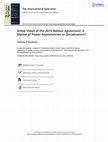
The International Spectator, 2022
In July 2015, after intense negotiations with its creditors, Greece received a bailout in exchang... more In July 2015, after intense negotiations with its creditors, Greece received a bailout in exchange for fiscal restraint. The coalition government at that time, led by the left-wing SYRIZA party, elected on the basis of an anti-austerity platform, eventually accepted the prevalent austerity frames of the creditors. Through the aid of Q-method, an analysis of Greek opinion leaders’ views of the negotiation highlights that this outcome can be explained in two different ways. The first posits that the ideological overtones that ruling SYRIZA injected in its negotiation strategy exhibited a lack of socialisation and undermined Greece’s already weak bargaining position. The second focuses on the institutional status quo bias in the Eurogroup in Germany’s favour, which discourages any change in the Eurozone. These two views may have partly been influenced by questions of political accountability.
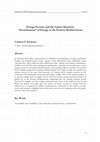
Politikon: The IAPSS Journal of Political Science, 2015
In February 2014, Nikos Anastasiades, the President of the Republic of Cyprus and Dervis Eroglu, ... more In February 2014, Nikos Anastasiades, the President of the Republic of Cyprus and Dervis Eroglu, the Turkish-Cypriot leader, signed a Joint Declaration that established certain “ground-rules” upon which the then stalled peace talks -aiming at the island’s reunification- could be revived. The main stimulant prompting this evolution was the discovery of new energy sources in the Eastern Mediterranean, and especially offshore the RoC. In October 2014, Turkish navigational warning notified mariners that Turkey would soon perform its seismic surveys in sea areas that encroach on Cyprus’s EEZ, raising concerns on the escalation of the intractable and protracted Cyprus conflict. Aim of this research project is to provide readers with an insight on how the flow between energy and power politics is played out in the Eastern Mediterranean. Suggesting that the existing tensions extend beyond the struggle over the existing material energy assets in the seabed of the Levant Basin, the project ca...
Southeast European and Black Sea Studies, 2019
SocioEconomic Challenges, 2017
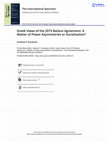
The International Spectator, 2022
In July 2015, after intense negotiations with its creditors, Greece received a bailout in exchang... more In July 2015, after intense negotiations with its creditors, Greece received a bailout in exchange for fiscal restraint. The coalition government at that time, led by the left-wing SYRIZA party, elected on the basis of an anti-austerity platform, eventually accepted the prevalent austerity frames of the creditors. Through the aid of Q-method, an analysis of Greek opinion leaders’ views of the negotiation highlights that this outcome can be explained in two different ways. The first posits that the ideological overtones that ruling SYRIZA injected in its negotiation strategy exhibited a lack of socialisation and undermined Greece’s already weak bargaining position. The second focuses on the institutional status quo bias in the Eurogroup in Germany’s favour, which discourages any change in the Eurozone. These two views may have partly been influenced by questions of political accountability.
International Journal of Human Rights and Constitutional Studies, 2013
Throughout the last years, the Euro-zone has been facing a severe crisis jeopardising its very ex... more Throughout the last years, the Euro-zone has been facing a severe crisis jeopardising its very existence. The research question this article seeks to address is two-fold: how is the Euro crisis framed by Germany and its Euro-zone partners and why in this way? The importance of successfully addressing this research question rests upon the idea that the Euro crisis provides a very useful opportunity to explore the way framing unfolds and if, then, it can offer practical policy solutions. Thus, the question is not how policy problems are formally and objectively defined, but how these problems are defined by key political actors.
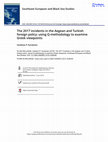
Southeast European and Black Sea Studies, 2019
In January 2017, relations between Greece and Turkey were under severe strain when warships from ... more In January 2017, relations between Greece and Turkey were under severe strain when warships from both sides engaged in a brief standoff near a pair of uninhabited Greek ‘islets’ in the Aegean, whose sovereignty is disputed by Turkey. Theoretically informed by the literature of foreign policy analysis, we examine how the Greek diplomats, military officers and political analysts interpreted Turkey’s behaviour at that particular time. The article considers the following research question: which factors, from a Greek point of view, explain Turkey’s foreign policy in the Aegean in January 2017? Our theoretical expectation is that, in the aftermath of the coup attempt in Turkey, Greek diplomats, military officers and political analysts would ascribe domestic calculations into Turkey’s activities. We employed Q- methodology to uncover socially shared perspectives on this topic. Based on our findings, we uncovered two viewpoints: (1) Turkey’s diachronic strategy in the Aegean and (2) the strongman style. According to the former and most widely shared viewpoint, a consistent ‘rationalist’ strategy to change the status quo in the Aegean explains Turkey’s behaviour. According to the second one, the belief system of Turkey’s leadership legitimises the use of force in the conduct of foreign policy.
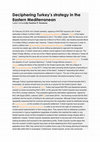
On February 23 2018, five Turkish warships, applying a NAVTEX issued by the Turkish authorities i... more On February 23 2018, five Turkish warships, applying a NAVTEX issued by the Turkish authorities in Block 3 of RoC’s EEZ[1], harassed the drilling rig Saiepem 12000 of the Italian state-owned company ENI, and threatened to sink it. The Italian vessel, after the discovery of an allegedly important amount of gas reserves in Block 6 of RoC’s EEZ, was heading towards Block 3 to initiate drilling in another well. However, Turkey’s threats forced it to maneuver in order to avoid a collision and sail for another drilling destination (Morocco). A similar incident had occurred two weeks ago; while the same drilling-rig attempted to approach the designated surveying spot, a Turkish vessel set a collision course against it and ordered it to stay put. The Italian Foreign Ministry, on the eve of the 4 March general elections in Italy, followed a “hands off policy”, claiming that this issue did not concern the bilateral relations between Italy and Turkey, but “relations and economic balances between the RoC and the Island’s northern part”. To justify the adoption of such “gunboat diplomacy”, Turkish Foreign Ministry issued a press release casting the blame of this standoff on the Greek-Cypriot side. After the collapse of the Crans Montana talks in July 2017, Turkey has been accusing Greek-Cypriots of persisting in “acting as though they were the sole owner of the Island”, instead of “expending their efforts towards a just and lasting comprehensive settlement in Cyprus”. The aim of this piece is to read between the lines and explain the structural and domestic stimulants prompting Turkey’s behavior.

The research question that this article attempts to address is: what are the main policy paradigm... more The research question that this article attempts to address is: what are the main policy paradigms that guide the opinion leaders throughout energy security matters within protracted conflict environments? Using the de facto divided island of Cyprus as our single case study, we will deliberately follow grounded theory in order to create conceptual definitions out of rudimentary " working ideas " that involve " protracted conflict environment " , " energy security " and stakes in " decision making ". This research enterprise involves open-ended interviews with the opinion-makers on the Island and " political discourse analysis " that identifies the quintessential aspects of the recently emerged energy debate. Drawing upon the work of Correlje and van der Linde (2006), we highlight two main paradigms: " markets and institutions " and " regions and empire ". In the first one, the business logic prevails upon political expediencies and geopolitical calculations, while in the second one, national and security concerns outweigh the business logic and the potential international economic integration. Through their interaction, we seek to explore how they drive the debate on energy security within the realm of a conflict environment.
Throughout the last years, the Euro-zone has been facing a
severe crisis jeopardising its very e... more Throughout the last years, the Euro-zone has been facing a
severe crisis jeopardising its very existence. The research question this article seeks to address is two-fold: how is the Euro crisis framed by Germany and its Euro-zone partners and why in this way? The importance of successfully addressing this research question rests upon the idea that the Euro crisis provides a very useful opportunity to explore the way framing unfolds and if, then, it can offer practical policy solutions. Thus, the question is not how policy problems are formally and objectively defined, but how these problems are defined by key political actors.
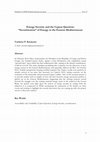
In February 2014, Nikos Anastasiades, the President of the Republic of Cyprus and Dervis Eroglu, ... more In February 2014, Nikos Anastasiades, the President of the Republic of Cyprus and Dervis Eroglu, the Turkish-Cypriot leader, signed a Joint Declaration that established certain “ground-rules” upon which the then stalled peace talks -aiming at the island’s reunificationcould be revived. The main stimulant prompting this evolution was the discovery of new energy sources in the Eastern Mediterranean, and especially offshore the RoC. In October 2014, Turkish navigational warning notified mariners that Turkey would soon perform its seismic surveys in sea areas that encroach on Cyprus’s EEZ, raising concerns on the escalation of the intractable and protracted Cyprus conflict. Aim of this research project is to provide readers with an insight on how the flow between energy and power politics is played out in the Eastern Mediterranean. Suggesting that the existing tensions extend beyond the struggle over the existing material energy assets in the seabed of the Levant Basin, the project casts light upon the notion of energy security by setting forth the indicators it is composed of. While scrutinizing the statements of the leaders on these events and seeking to highlight the security discourses they are coming up with, the project resorts to discourse analysis.
Aim of Working Paper No. 8 is to explain how the legal piece of the "availability" indicator, dep... more Aim of Working Paper No. 8 is to explain how the legal piece of the "availability" indicator, depicted in Working Paper No. 7 comes into play. It stresses need to lay the ground-rules and the theoretical legal constraints within which the stakeholders in the Eastern Mediterranean are assumed to pursue their interests. To rephrase, the main objective here is to outline the official rules of the game by which the state protagonists are supposed to abide. To this effect, this paper will initially present the historical development of the international law of the sea. We will navigate the historical journey that concluded to the UN Convention on the Law of the Sea (UNCLOS III).
Aim of this project is to help readers comprehend that
the recent tensions have not appeared out ... more Aim of this project is to help readers comprehend that
the recent tensions have not appeared out of the blue. It provides them with a
detailed background-an insight on how the flow between energy and power politics displays in the Eastern Mediterranean, a region riven by long-standing conflicts.
The report will initially provide the readers with the general framework within which this phenom... more The report will initially provide the readers with the general framework within which this phenomenon unfolds. In other words, it will describe how the fuel market works in Greece. The second part will underline the problematic aspects of this functioning with special attention to the phenomenon of oil smuggling that has become dominant in the realm of the Greek economy. The third part will assess the influence that this phenomenon exerts on the taxpayers' income. The paper will conclude with certain measures that should be taken in order to tackle this phenomenon.
Central aim of the paper is to analyze the reasons why paying taxes in Greece makes someone an "i... more Central aim of the paper is to analyze the reasons why paying taxes in Greece makes someone an "irrational" actor. it presents certain incentives that encourage tax evasion in the country. The first part will briefly document the level of tax evasion in Greece. The second part will list all the stimulants that have prompted the phenomenon of tax evasion in the country. Finally, the report will comment on the words of the former Greece’s Finance Minister, according to which "Greeks
are not overtaxed".
This report seeks to embark upon this journey throughout
Cyprus' history and aims to cover -to th... more This report seeks to embark upon this journey throughout
Cyprus' history and aims to cover -to the extent this is feasible- the period starting from antiquity to the Berlin Congress in 1878, when Cyprus was ceded by the Ottoman Empire to the British.











Uploads
Books by Vasileios P. Karakasis
Papers by Vasileios P. Karakasis
severe crisis jeopardising its very existence. The research question this article seeks to address is two-fold: how is the Euro crisis framed by Germany and its Euro-zone partners and why in this way? The importance of successfully addressing this research question rests upon the idea that the Euro crisis provides a very useful opportunity to explore the way framing unfolds and if, then, it can offer practical policy solutions. Thus, the question is not how policy problems are formally and objectively defined, but how these problems are defined by key political actors.
the recent tensions have not appeared out of the blue. It provides them with a
detailed background-an insight on how the flow between energy and power politics displays in the Eastern Mediterranean, a region riven by long-standing conflicts.
are not overtaxed".
Cyprus' history and aims to cover -to the extent this is feasible- the period starting from antiquity to the Berlin Congress in 1878, when Cyprus was ceded by the Ottoman Empire to the British.
severe crisis jeopardising its very existence. The research question this article seeks to address is two-fold: how is the Euro crisis framed by Germany and its Euro-zone partners and why in this way? The importance of successfully addressing this research question rests upon the idea that the Euro crisis provides a very useful opportunity to explore the way framing unfolds and if, then, it can offer practical policy solutions. Thus, the question is not how policy problems are formally and objectively defined, but how these problems are defined by key political actors.
the recent tensions have not appeared out of the blue. It provides them with a
detailed background-an insight on how the flow between energy and power politics displays in the Eastern Mediterranean, a region riven by long-standing conflicts.
are not overtaxed".
Cyprus' history and aims to cover -to the extent this is feasible- the period starting from antiquity to the Berlin Congress in 1878, when Cyprus was ceded by the Ottoman Empire to the British.
Joint Declaration. It should be stressed that both leaders have agreed that this document does not reflect the (re)solution of the Cyprus problem.
the joint declaration between President Anastasiades and the Turkish Cypriot Leader Eroglu, one of the main points of this paper is to explain the timing as the key variable in the launch of the 2014 negotiations. t aims to address the interplay of carrots and sticks beyond the declaration that makes negotiators consider the momentum of a settlement more than convenient. It will delineate the reasons why EU, US and UN officials strongly believe that the ripe moment to permanently resolve the Cyprus question has finally arrived.
geography remains a key variable in shaping the grand strategy of states.
The description of the problems and the perspectives in the Greek détente strategy which will streamline the alternative combinations of the power factors of the country, and especially the maximization of the cost for the enemy in case that the last one carries out its threats play a very important role in this framework. Issues also with philosophical and methodological dimension for the people and the political leadership are put into question in front of the following dilemma: “détente or appeasement”. It is supported by the authors that a détente strategy should be developed because of the following reasons:
a. There are threats from the prompt international environment emanating from the East and that’s why they should be confronted.
b. A serious and public conversation about the national strategy should be done, concerning that the decision of the ’70 and ’80 have guided the country to ineffectiveness, regression and defeatism.
c. Analysis of the failed adaptation attempts to the external threat. That caused the degradation of the power’s factors from internal and political factionalism between the parties